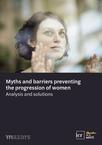Mazars and the Observatory for Gender Balance publish report debunking eight myths that hold back women's careers
• Expert analysis and solutions to debunk eight myths, including: lack of ambition, motherhood/availability, absence of women in talent pools, part-time work, risk aversion, glass ceiling, men's jobs, quotas and meritocracy
•The keys and levers for successful change: testimony from ten experts and four leaders
•Launch of a self-assessment tool on diversity strategies for CEOs and top executives
25 October, Paris – Mazars, the international audit, tax and advisory firm, and the Observatory for Gender Balance have partnered to address the stereotypes and biases that persist as obstacles to increasing gender diversity in organisations – and suggest proposals on how to solve them. This report features a series of eight myths debunked by gender experts and leaders, as well as a new self-help tool designed to help CEOs quickly assess the diversity programmes in their organisation and understand whether they have implemented the “six measures that work” to accelerate gender equality.
While there are no one-size-fits-all solutions as each business has a unique corporate culture that calls for an arsenal of targeted solutions, all businesses share the need to adjust or compensate for an unequal social and professional playing field for women, upheld by socio-economic myths as well as cultural and unconscious biases.
Eight myths debunked by experts
- Myth 1: “Women have no or less ambition”;
- Myth 2: “Motherhood is not compatible with a leadership position”;
- Myth 3: “The invisible woman” or “We can’t find competent female candidates in the talent pool”;
- Myth 4: “Women are risk averse”;
- Myth 5: “Part-time work is not compatible with leadership roles”;
- Myth 6: “Gender inequalities are mainly found at the top of the corporate ladder”;
- Myth 7: “There are men’s jobs”;
- Myth 8: “Quotas are not based on merit and unfair to men, and risk pushing incompetent women into key positions”.
“Given the slow pace of change, we wanted to understand the persistent myths that may be slowing down companies’ efforts to promote gender diversity," explains Cécile Kossoff, Global Diversity and Inclusion Leader at Mazars Group.
Hervé Hélias, CEO and Chairman at Mazars Group, says: "Beyond equality and fairness, this is a business concern. It is no longer possible to operate in a male vacuum. Diversity is a source of openness and better performance – it allows for richer exchanges, new visions, and less biased decisions. Today, it has become a general management issue, which must be addressed at the highest level.”
Is more legislation the way forward?
When we look at the evolution of diversity across the world, we can see that we’ve come a long way. However, despite great progress, we still have a long journey ahead. In 2019, only 20% of board members worldwide were women.
At the national level, countries like France have proved the power of legislation. Standing out as the most advanced country in this domain, France has reported 46% of women sitting on boards of directors since 2021, under the impetus of the Coppé-Zimmerman law. Improvements have been greatest in countries that have imposed binding quotas, including France, Italy, Germany and Belgium.
Caroline de La Marnierre, Co-coordinator of the Observatory for Gender Balance, states: "According to the UN, the world's GDP could increase by 26% by closing the gaps between women and men in the labour market: so concrete solutions are urgent! In order to begin this journey, it is important to set precise and ambitious gender equality objectives at all levels, as to guide organisations internally on the subject.”
“Breaking down these barriers will require an international shift in ideology and how diversity and inclusion is approached – the focus should be less on reinforcing female leadership skills and more on systemic changes to the work environment and business practices” adds Cécile Kossoff.
Managing gender diversity: a self-assessment tool for senior management
Because managing diversity and inclusion has become an essential skill for managers, Mazars and the Observatory for Gender Balance have developed a self-assessment tool for CEOs. This concrete, educational and very practical checklist allows them to quickly assess the relevance of their gender diversity programmes, based on the six measures to accelerate gender diversity published by the Observatory. It is available here.
"CEOs have to lead this from the top and be role models through the vocabulary they use, the appointments they make, their sponsorship of high-potential women, their refusal to participate in all-male panels and applying zero tolerance towards unacceptable behaviours. The regular inclusion of gender progression in the ExCom agenda is also a strong sign of commitment”, concludes Marie-Christine Maheas.
Download the full report here.
###
Press Contacts
Mazars
Cécile Kossoff, -- Global Diversity and Inclusion Leader at Mazars Group – +33 (0) 1 49 97 65 72 - cecile.kossoff@mazars.com
Lorraine Hackett -- Group Brand & Communications Director – +44 (0)7881 283 962 -- Lorraine.hackett@mazars.co.uk
The Observatory for Gender Balance
Katie Lansing – ESG Manager –+33 (0)6 71 48 29 69 – klansing@institutcr.com
About Mazars
Mazars is an internationally integrated partnership, specialising in audit, accountancy, advisory, tax and legal services*. Operating in over 90 countries and territories around the world, we draw on the expertise of more than 44,000 professionals – 28,000+ in Mazars’ integrated partnership and 16,000+ via the Mazars North America Alliance – to assist clients of all sizes at every stage in their development.
*Where permitted under applicable country laws
About the Observatory for Gender Balance
Supported by the Institute for Responsible Capitalism, sponsored by Michel Landel, independent Board Member and former CEO of Sodexo, and co-directed by Caroline de La Marnierre and Marie-Christine Mahéas, the Observatory for Gender Balance is a think and do tank that brings together companies active in the field of gender balance, as well as recognised experts in the field.
Its objective is to make rapid and sustainable progress in gender balance within organisations by producing concrete recommendations for decision-makers, companies and institutions.

